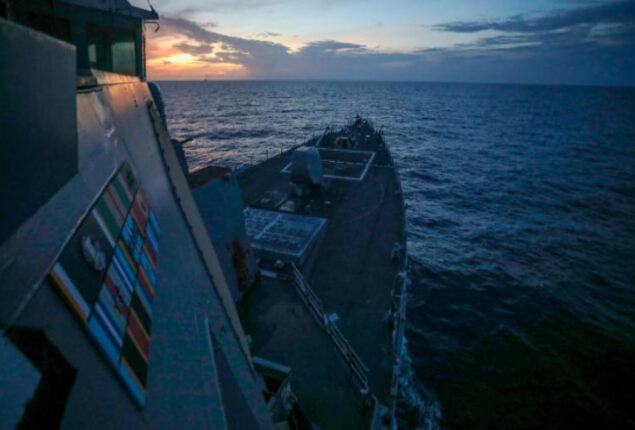China raises voice over Kashmir issue in UNSC
Chinese spokesperson for the Ministry of Foreign Affairs Geng Shuang expressed his...

UK sea level rise speeding up(credits:goggle)
Australia has been accused by China of inciting trouble in the South China Sea, and the country, along with the US and Canada, have been told to “refrain from abusing China’s restraint.”
In response to a question concerning recent military encounters in the South China Sea, including Politico reporting that a Chinese fighter jet had a “unsafe” and “unprofessional” engagement with an American C-130 aircraft, foreign ministry spokesperson Wang Wenbin made the following statement.
According to Politico, the meeting took place as Chinese pilots were engaging in increasingly aggressive military manoeuvres involving Australian and Canadian aircraft.
An RAAF P-8 maritime surveillance aircraft was stopped by a Chinese fighter jet shortly after the Australian election in May, which Prime Minister Anthony Albanese referred to as “an act of aggression and a hazardous act.”
The Communist party-controlled Global Times published Wang’s statements regarding the interactions.
Penny Wong as well as Anthony Albanese
Anthony Albanese claims that Australia “doesn’t respond to requests” from China.
Wang reportedly earlier stated that the activities were a “total provocation” to China, according to The Global Times.
After the Australian foreign affairs minister, Penny Wong, met her Chinese counterpart, Wang Yi, in Bali earlier this month, there have been some indications of thawing relations between Australia and China.
Trade, China’s militarization of the South China Sea, the artificial islands it has created, and its claims to territory that other Asian countries are disputing continue to be points of contention.
As it does everywhere else in the world, the US regularly conducts freedom of navigation operations (Fonops) in the region to refute claims made by other nations to territorial rights.
Australia has come under some pressure to follow suit as a result. However, despite frequently exercising its right to send warships and aircraft through the region (which includes important commerce routes), Australia never gets closer than 12 nautical miles to Chinese land.
Some have suggested that Richard Marles, the next defence minister, would launch a plan more like to one in the US. The ministerial wording has changed, according to Australian National University professor of international law Donald Rothwell.
Marles declined to comment on the event but noted that Australia often despatched warships in response to an ABC report from earlier this month about an Australian warship being watched by a Chinese submarine.
The freedom of navigation, freedom of overflight, and the global rules-based order, which I’ve been emphasising as being so crucial for our national interest, are the main objectives of the organisation, which has been doing this for decades.
On Friday, July 8, 2022, during the G20 Foreign Ministers’ Meeting at Nusa Dua in South Kuta, Bali, Indonesia, Australian Foreign Minister Penny Wong and Chinese Foreign Minister Wang have a bilateral meeting. (Pool, Johannes P. Christo, AAP Image) DO NOT ARCHIV
The statement, according to Rothwell, appeared to be a “hardening” of the phrase. He declared, “We’ve never officially performed Fonops like the US.” But right now, we’re actively ‘asserting,’ because we think the law of the sea agreement allows us to.
According to Ben Scott, director of the Lowy Institute’s Australia’s Security and the Rules-Based Order Project, a minister would typically use the word “exercise” freedom rather than “claim”
When compared to the official Defense statements, Scott stated, “His take has been lot more front-footed.”
He added that Marles had demanded that Australia launch Fonops while in opposition.
Marles stated in 2016 that the navy and air force should be permitted to conduct freedom of navigation drills in the South China Sea, including within 12 nautical miles of the man-made islands China has constructed there.
According to international law, it is crucial that we assert our right to cruise the high seas, he told the Sydney Morning Herald.
For a response, Marles has been approached.
According to Australian National University professor of international security and intelligence studies John Blaxland, it is critical that Australia maintain its current operations because “if you don’t exercise a right, you gradually forfeit it.” However, he claimed that Australia’s strategy had been “consistent” for 40 years.
We recognise that if we stick our heads too much over the parapet, we could become targets.
China continues to increase the size of the zone it claims, including via its alleged “nine-dash line,” while Australia has remained steady.
China is attempting to intimidate or scare away anyone who wish to exercise their rights of passage and navigation, according to Blaxland.
Catch all the International News, World News, Breaking News Event and Latest News Updates on The BOL News
Download The BOL News App to get the Daily News Update & Follow us on Google News.